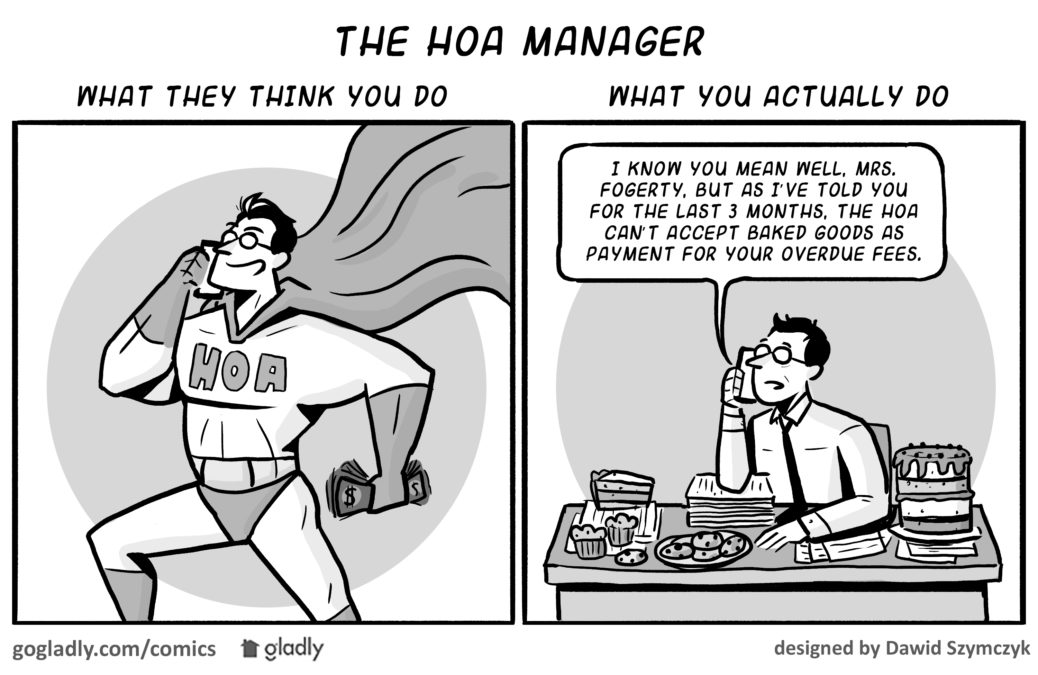Sometimes it seems that homeowners think community association managers have superpowers. They are all-knowing, have x-ray vision, and are able to resolve all matters with a simple decree.
But when you’re actually in the trenches of your job, you know superpowers aren’t exactly part of the package.
Misunderstandings about the responsibilities of the manager, misconceptions about the roles of the board vs. management, and lack of knowledge about the proper functions of community associations often leave homeowners confused. Let’s face it, few buyers read — much less understand — the pile of association-related legal documents they receive at closing.
You can’t really blame homeowners, especially newbies, for being a little fuzzy on the details. Sometimes even management could use a little refresher on what their roles really are. Let’s clarify some common misconceptions about the role of association management.
New Rules and Policies — Who Decides?
A medical doctor whose daughter was a resident in one of our communities wanted the association to be declared a non-smoking complex. When he contacted me (CMCA with the management company), I explained that this not a decision made by management. Rather, it would require an amendment to the declaration. He was not dissuaded, and continued to send me anti-smoking materials and impassioned emails about the dangers of secondhand smoke. I finally had to have the association legal counsel send him a letter verifying the process to implement such a change.
Rather than work with the HOA board to garner support for an amendment to the declaration, he ended his anti-smoking campaign. He meant well, but he just didn’t understand how it works. Unfortunately, this is the case with a lot of homeowners in any community. They are trying to get involved as a stakeholder in what happens in their neighborhood (usually a positive thing). But they don’t necessarily know where to direct that energy, so they come directly to you. When this happens, rather than playing along, it’s important to explain what is and is not within your power.
While it might be easier to convince one person to implement change by decree, that contradicts the spirit of a representative democracy, which is at the foundation of community associations. While it can be a slow and messy process, working with your elected board and neighbors to reach consensus is in every homeowners’ best interest.
Assessments and Fees — and Who Works for Whom?
When we take over management of a community association, at the introductory meeting I am always asked if assessments will increase or payment due dates will be changed. I explain that management companies do not make such decisions, but that these things are decided by the HOA board of directors.
On this and other issues, it is often helpful to remind homeowners that management works for the board, not the other way around.
Building Operations — Who’s the Expert?
Many times as a CMCA, I have been asked to provide a detailed explanation of how a heating system works. I’ve also had irritated board members want me to provide free legal advice (without a license). I have even been asked to do a full inspection of the common elements and report to the board on how long they should expect major components to last (because after all, a reserve study was too costly).
While a professional manager often has a working knowledge of building components, property services, and association law, we are not licensed professionals in those fields. And really, you’re not supposed to be; that’s what licensed specialists are for. There are good reasons why we use a strong network of contacts to help us identify the best experts in each niche. This is simply the best way to address the unique needs of each association.
When you’re asked to do something outside your role — or your comfort zone — be sure to stand your ground and explain what part you’re actually supposed to play. Then find the right person to help.
Don’t Be a Hero
Sure, homeowners might seem like they expect you to be a superhero. However, don’t let that pressure you into realms that you really aren’t equipped to handle. As managers, our objective is to act as a trusted advisor and guide to the community, knowing who to go to for certain things. Not everything is part of your job description, so save the super suit for Halloween.
If there is a “super” associated with a community manager’s name, it refers to the level of commitment and dedication that they have toward their profession. No cape is required for that.
- Desperately Seeking Conflict - June 14, 2019
- The Role of HOA Management — Hang Up Your Super Suit - December 13, 2018
- Jerry Springer is NOT on the Agenda!
Taking Control of HOA Meeting Conduct - May 16, 2018



 Help
Help